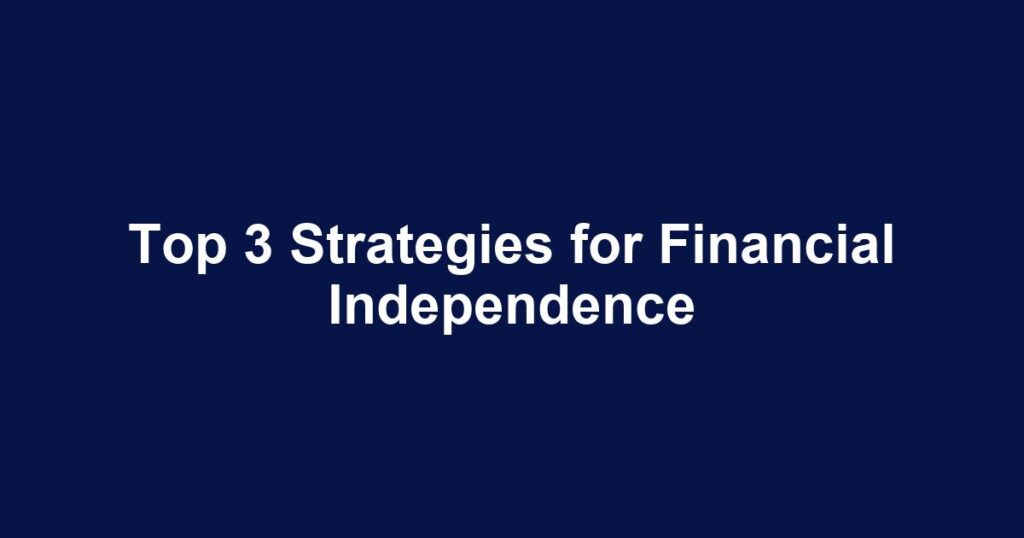Introduction
Everyone dreams of achieving financial independence. It’s the freedom to live life on your own terms, without the stress of financial worries. But how do you get there? We’ve distilled the journey to financial independence into three powerful strategies. This guide will give you insight into effective investment strategies and essential wealth management tips that can set you on the path to a secure financial future.
Understanding Financial Independence
Before diving into the strategies, it’s important to understand what financial independence truly means. Financial independence is the state of having sufficient personal wealth to live, without having to actively work for basic necessities. This often involves a combination of smart budgeting, intelligent investments, and wise wealth management practices.
What Are the Signs of Financial Independence?
- You can cover your living expenses through passive income streams.
- Your investments generate consistent returns.
- You have a clear financial plan with defined goals.
- Your savings grow year-over-year without requiring significant effort.
Top 3 Strategies for Financial Independence
1. Develop a Smart Investment Strategy
One of the cornerstones of financial independence is a solid investment strategy. Without properly managing your investments, reaching your financial goals can be challenging. Here’s how to craft an effective investment strategy:
Assess Your Risk Tolerance
It’s essential to know how much risk you’re willing to take. Factors include your age, income, and financial goals. Younger investors may take more risks for higher returns, while those nearing retirement might prefer safer investments.
Diversify Your Investment Portfolio
Diversification is a key principle of investing. Here’s how you can diversify:
- Stocks: Consider a mix of growth and dividend stocks.
- Bonds: Invest in government and corporate bonds for stability.
- Real Estate: Real estate can provide rental income and appreciation.
- Mutual Funds/ETFs: These can offer instant diversification within your stock and bond investments.
Invest for the Long Term
Short-term market fluctuations can be erratic, but long-term investing typically yields better results. Consider these tips:
- Stay committed to your investment plan, even during downturns.
- Contribute regularly to your investment accounts to take advantage of dollar-cost averaging.
- Reassess your portfolio annually to ensure it aligns with your goals.
2. Implement Effective Wealth Management Practices
Alongside a sound investment strategy, effective wealth management is crucial for financial independence. This not only involves managing your investments but also optimizing your financial resources.
Create a Budget and Stick to It
To achieve financial independence, you need to know where your money goes. Consider these steps:
- Track your expenses using budgeting apps or spreadsheets.
- Identify discretionary spending that can be reduced or eliminated.
- Set savings goals each month and automate transfers to savings accounts.
Build an Emergency Fund
An emergency fund is essential in wealth management. It protects you from unexpected expenses and helps maintain your financial independence. Aim for:
- Three to six months’ worth of living expenses in a high-yield savings account.
Plan for Retirement
Retirement planning is a vital aspect of wealth management. Here’s how to get started:
- Contribute to tax-advantaged retirement accounts, such as 401(k)s or IRAs.
- Consider working with a financial advisor to create a retirement plan tailored to your life goals.
3. Maximize Your Income Streams
To accelerate your journey toward financial independence, consider maximizing your income through various avenues. This multi-pronged approach can drastically improve your financial situation.
Explore Side Hustles
Side hustles can provide significant additional income. Here are some options:
- Freelancing: Utilize your skills in writing, graphic design, or programming.
- Online Tutoring: Share your knowledge in subjects you excel in.
- Real Estate Investing: Consider renting out property or getting into REITs (Real Estate Investment Trusts).
Invest in Your Education
Investing in yourself can enhance your earning potential. Here’s how:
- Take certifications related to your field for career advancement.
- Enroll in workshops or online courses to acquire new skills.
Network for Opportunities
Building a strong professional network can open doors to new opportunities. Consider:
- Attending industry conferences.
- Joining professional associations.
- Leveraging platforms like LinkedIn to connect with professionals in your field.
What Are the Common Questions About Financial Independence?
How to Achieve Financial Independence Faster?
To reach financial independence faster, focus on maximizing your savings rate, increase your income, and make strategic investments. Create a clear plan that outlines your financial goals and timelines.
Why Does Financial Independence Matter?
Financial independence offers freedom and peace of mind. It enables you to make choices based on your values and desires rather than being limited by financial constraints.
What Is the Role of Passive Income in Financial Independence?
Passive income plays a critical role as it allows for sustained income without the need for constant active work. It can come from investments, rental properties, or business ventures that require minimal ongoing effort.
Conclusion
Achieving financial independence is a journey that requires patience, discipline, and smart financial choices. By developing a smart investment strategy, implementing effective wealth management practices, and maximizing income streams, you can set yourself on the path to a financially secure future. Start taking actionable steps today, and become proactive in your pursuit of financial independence!
Ready to take the next step toward financial independence? Begin by assessing your investment strategy and exploring additional resources and tools that align with your goals!

